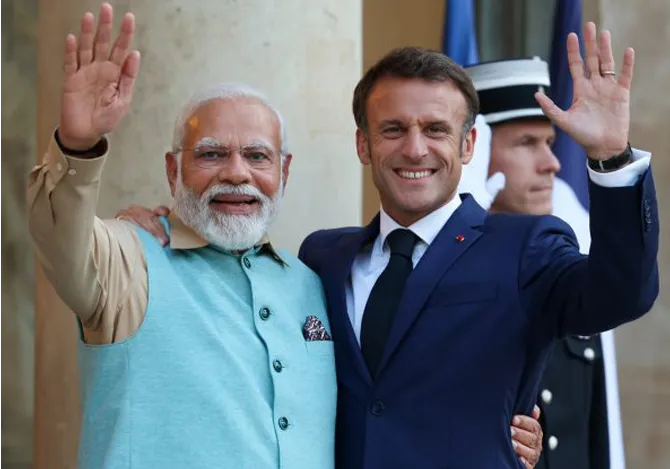India announced on December 22 that French President Emmanuel Macron will be the chief guest at India’s Republic Day celebrations in January. According to Indian media reports, his invitation was done on short notice because U.S. President Joe Biden, who was hoped to be the chief guest, could not come on account of the annual State of the Union address in Washington D.C.
Clearly, the French president’s confirmation, despite the last-minute request, reiterates for many in India that France is an all-weather friend that India can rely on. It will be the sixth time a French leader has been the chief guest at India’s Republic Day celebrations. French Prime Minister Jacques Chirac was the chief guest in 1976 and again as French president in 1998. Other French leaders so honored have included Valéry Giscard d’Estaing, Nicolas Sarkozy, and François Hollande in 1980, 2008, and 2016 respectively.
New Delhi and Paris have a lot in common in terms of their strategic perspectives on a free, open, inclusive, and prosperous Indo-Pacific. That the two countries make a big case for strategic autonomy in the face of major geopolitical churning in both Europe and the Indo-Pacific can be viewed as a key driver for India and France to pursue an even closer strategic agenda. Further, the two countries have both pushed for a strengthening of multilateralism and multilateral institutions by making such bodies more representative and effective.
The joint statement issued during Indian Prime Minister Narendra Modi’s visit to Paris earlier this year, in fact, highlighted the “shared values, belief in sovereignty and strategic autonomy, an unwavering commitment to international law and the U.N. Charter, an abiding faith in multilateralism, and a common quest for a stable multipolar world.”
The number of high-level visits between India and France is a demonstration of the importance that the two attach to each other. Modi was in France as the chief guest at the French National Day celebrations in July 2023. The visit was also an occasion to commemorate the 25th anniversary of the India-France Strategic Partnership. If one were to do a quick scan of the documents signed between the two sides, the visit was a major success. The two put out a number of documents, including a Joint Communique; Horizon 2047 – 25th Anniversary of the India-France Strategic Partnership, Towards a Century of India-France Relations; a list of outcomes; and the India-France Indo-Pacific Roadmap. Thereafter, Macron was in India for the G-20 Summit in September, when the two leaders reviewed and took stock of the many agreements signed in the summer.
India and France have remained close strategic partners with long-standing cooperation in all strategic sectors, including civil nuclear energy, defense, and outer space, and these came up in the bilateral meetings as well. The two discussed in particular how the two countries can loop in industries and start-ups to spur cooperation, especially in nuclear energy, including partnerships for co-developing small modular reactor and advanced modular reactor technologies, digital public infrastructure, critical technology, connectivity, energy, climate change, and education.
France has continued to enjoy unconditional support across the entire political spectrum in India and the larger public, and that helps the Indian government to pursue such partnerships without any impediment, be it in the civil nuclear energy arena or on the conventional defense front.
In fact, this also comes from the kind of staunch support that India has received from France at critical times in history. For instance, in May 1998, a few months after India and France elevated their partnership to a strategic partnership, India conducted its first nuclear tests, which were condemned across the international community. Many countries, including the U.S., Japan, the U.K., and others imposed sanctions on India. France was one country that did not condemn or sanction India for the nuclear tests, which is possibly something that New Delhi will continue to remember for a long time.
France is held, therefore, in high regard within India’s strategic calculations. And as Mohamed Zeeshan wrote in July this year, “if India has a natural ally, it’s probably France.” Japan arguably comes as a close second, with no historical baggage. Zeeshan noted France’s role as a middle power with significant geographical and geopolitical influence in the Indian Ocean: “France has the right mix of strengths and weaknesses to be India’s priority defense partner.”
Even during Modi’s visit in July, cooperation in the defense sector appeared to be high on the agenda, with India in need of more weapons and platforms and the inadequacies of Russian weapons on full display, accelerating the pace of Indian efforts to diversify its defense trade partners.
Amid rapidly changing balance of power politics, China’s belligerence and lucrative defense deals keep the France-India relationship on an ever-strong footing. However, it must also be noted that there are some differences between the two on international political issues. For example, France has been a strong supporter of Ukraine and sanctioned Russia after its invasion of Ukraine. Similarly, France has also sought closer economic ties with China. These are probably unlikely to make a big difference in the bilateral ties between New Delhi and Paris, but they are noteworthy, nevertheless.
This commentary originally appeared in The Diplomat.
The views expressed above belong to the author(s). ORF research and analyses now available on Telegram! Click here to access our curated content — blogs, longforms and interviews.




 PREV
PREV


